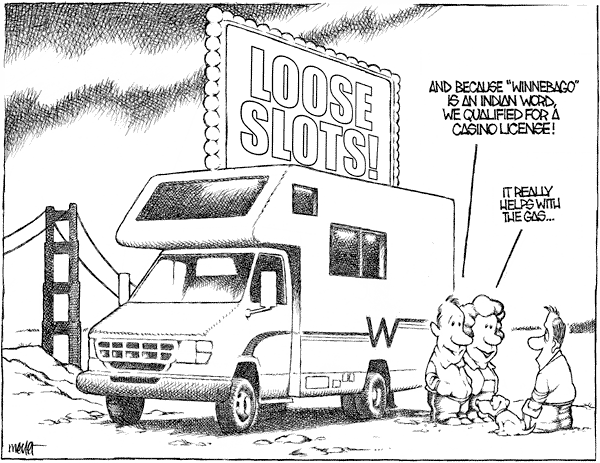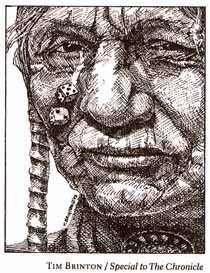 Another Stereotype of the Month entry:
Another Stereotype of the Month entry:
 Another Stereotype of the Month entry:
Another Stereotype of the Month entry:
By BRIAN LYMAN
Norwich Bulletin; bmlyman@norwich.gannett.com
Fromson, born in Weston but currently a resident of New York City, said the real story that came out of interviews and confidential tribal documents was of a group of people who existed as a tribe in name only.
"The Pequots are essentially living a lie, and that is one of the fundamental problems facing these people," Fromson said in an interview Thursday. "How do you become a tribe, when you're not a tribe, but you've been telling the world you are a tribe, all this time? What do you do? How do you make it work? It's extraordinary difficult, and I would submit, impossible."
What motivates the Pequots, according to Fromson?
Fromson painted a picture of a group of people frank about their ignorance of Pequot history, concerned mainly about money. A former tribal councilor expressed the sentiments of others quoted in the book: "If the money spigot stops, the members will in large part drift away in different directions. There will be a core of people left, but a lot of people will decide to go elsewhere."

Fromson's conclusion:
"You can't be a tribe if you don't have a ... living cultural tradition that unifies everyone, that is unique, that's not just borrowed from some other tribe, not just a general society with an Indian gloss, but something that really defines your group, your tribe as unique," he said. "There's nothing unique about the Pequots, and there are no shared values except a desire for money."
Rob's comment
If a lot of people would leave but some would remain, it seems the tribe isn't just about money. How many "genuine" Pequots does Fromson need before he'll concede the tribe is real? A hundred? A thousand? Or...?
Fromson's opinion that a tribe has to be unique or have a "living cultural tradition" is just that: his opinion. I'm pretty sure federal law doesn't state that anywhere. Nor does Fromson offer any proof—at least in this article—that the Pequots have no traditions. Their establishment of a cultural museum and an annual powwow would seem to argue otherwise.
Related links
The critics of Indian gaming—and why they're wrong
|
. . . |

|
All material © copyright its original owners, except where noted.
Original text and pictures © copyright 2007 by Robert Schmidt.
Copyrighted material is posted under the Fair Use provision of the Copyright Act,
which allows copying for nonprofit educational uses including criticism and commentary.
Comments sent to the publisher become the property of Blue Corn Comics
and may be used in other postings without permission.